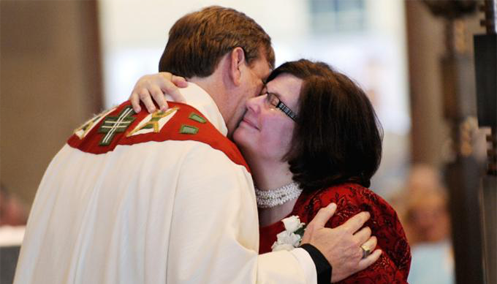


Common Objections
Common Objections
Catholic Outlook
Catholic Outlook

Catholic Outlook
Common Objections
Common Objections
__________ Recent Additions __________
Catholic Outlook
Catholic Outlook
__________ Catholic Customs __________
“The Catholic Church forbids priests to marry, which Paul says is a thing ‘taught by demons’.”
Gary Hoge

Let’s take a look at what Paul said in context:
The Spirit clearly says that in later times some will abandon the faith and follow deceiving spirits and things taught by demons. Such teachings come through hypocritical liars, whose consciences have been seared as with a hot iron. They forbid people to marry and order them to abstain from certain foods, which God created to be received with thanksgiving by those who believe and who know the truth. (1 Timothy 4:1-3)
So, who were these “hypocritical liars” who forbid people to marry? According to the Protestant International Bible Commentary,
Probably it reflects the Gnostic heresy which regarded matter as intrinsically evil, and which found specific expression in recommending avoidance of marriage and abstinence from certain foods.1
The Gnostic heretics believed that the material world, including our physical bodies, was created by an evil god, and was therefore evil. They believed that our spirits were created by a good god. Thus, to them procreation, which is the primary purpose of marriage, was evil because it caused a good spirit to become trapped within an evil body.
This was what Paul was denouncing as a thing “taught by demons.” He was not discussing the relative merits of a celibate priesthood, but the goodness of marriage in general.
The Catholic Church certainly agrees that marriage is a very good thing. In fact, the Church considers marriage to be one of the seven sacraments. Further, the Church does not forbid anyone to marry. Anyone who is called by God to the married state (which is almost everybody) is free to marry. However, the Church knows that God has called some to live an unmarried life, in order to serve him wholeheartedly. It is from this group that the Church selects her priests. Foregoing marriage in order to better serve the Lord is something Paul definitely approved of. He wrote,
I wish that all men were as I am. But each man has his own gift from God; one has this gift, another has that. … I would like you to be free from concern. An unmarried man is concerned about the Lord’s affairs – how he can please the Lord. But a married man is concerned about the affairs of this world – how he can please his wife – and his interests are divided. (1 Corinthians 7:7, 33-34)
Likewise, Jesus also pointed out that some “have renounced marriage because of the kingdom of heaven.” And, significantly, he added, “The one who can accept this should accept it.” (Matthew 19:11-12). So according to the apostle Paul and the Lord Jesus himself, those who wish to serve the Lord full-time “should” renounce marriage.
The Catholic Church follows this advice. And she recognizes that this is advice, not a requirement. Priestly celibacy is considered a discipline of the Church, not a doctrine. The Church follows this discipline because Paul and Jesus said that it was the best way. However, because celibacy is not an intrinsically necessary feature of the priesthood, that requirement could be modified, or even dropped, if the Church decided to do so.
Also, it’s worth noting that the Catholic Church is organized into about a dozen different “rites,” of which only one, the “Latin” or “Roman” rite, requires priestly celibacy. In the Eastern rite churches, married men may become priests. The Latin rite, though, is by far the largest rite in the Church, especially here in the West. It’s what you probably think of when you think of the Catholic Church. However, because celibacy is not an intrinsic feature of the priesthood, the requirement is sometimes waived, even in the Latin rite. For example, Protestant ministers who convert to the Catholic Church are often allowed to become Catholic priests in the Latin rite, even if they are married.
__________
1 Alan G. Nute, “1 Timothy,” International Bible Commentary, ed. F.F. Bruce, (Grand Rapids, MI: Zondervan Publishing House, 1986), 1418.
Copyright © 2024 Catholicoutlook.me
MENU